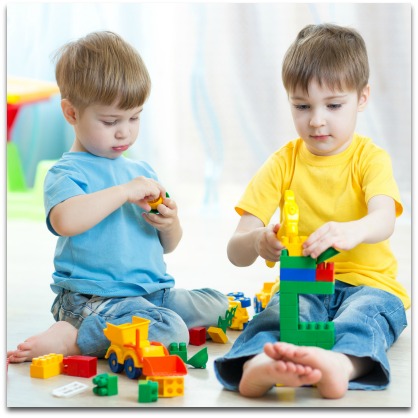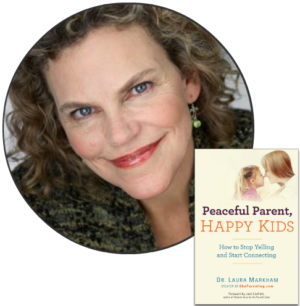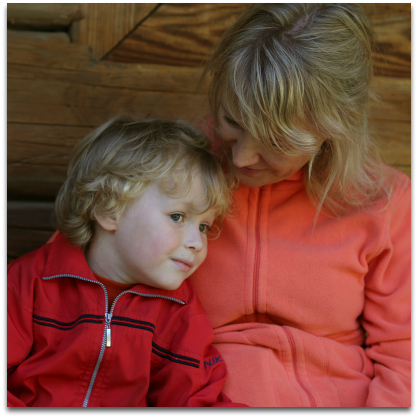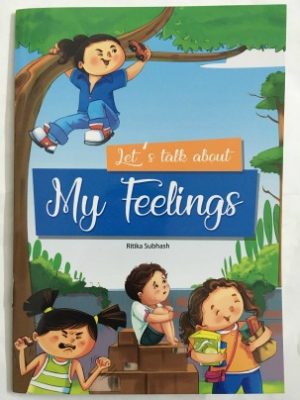 The other day, I was wondering what kind of life my son will have as he is growing up.
The other day, I was wondering what kind of life my son will have as he is growing up.
He is about to start kindergarten. I am filled with anxiety mixed with excitement. In part because I am acutely aware of the burst of emotions that he is in for as he starts this new journey.
I don’t remember much of my own early childhood and school-life. I was rather shy and timid at school and boisterous and headstrong at home. I also remember not being able to handle big emotions too well and not being good at conflict resolution.
Being the younger of two siblings, I got a lot of leeway and protection from my parents. Because they handled everything for me I never felt the need to work through my complicated emotions or work out issues cordially.
Looking back, I feel that even though that was convenient for me, it didn’t really give me the necessary tools to verbalize and understand my emotions too well.
As a parent of a three and a half year old, I am extremely conscious of this. Not only do I share my own feelings with him, I encourage him to talk about his feelings with me.
One day, as we were getting into the car after preschool my son, said, “Ma, I don’t want to go to school again.”
Of course, I feared the worst and thought something bad might have happened. I mustered up the courage to ask, “Why not, sweetie?”
He answered, “No one loves me here.”
I was a little taken aback, because I had often seen his class teachers showering him with affection. On probing more, he shared that the teachers, in fact, did love him, but none of the classmates did. I asked if anyone pushed him or treated him poorly, but that was not the case. He was expecting all the classmates to play with him and to be friendly, just like he was.
Because they didn’t show affection in the same way, he felt that they didn’t love him!
I had to explain to him that children this age are mostly learning to explore themselves and their own gifts, rather than making friends. And not everyone feels like playing with another person all the time. I also reminded him of all the times that he and his classmates played together in the gym area or during circle time.
Needless to say, he was back in school the next day, smiles and all.
Essentially, what this episode showed me was that my little one was not just able to understand his own emotions, he could verbalize them, feel secure enough to share them with a trusted adult and even be open to work through those emotions.
It has truly been a revelation. He has shared so much with me, in a candid and matter-of-fact way. I feel I understand him a lot better than I would if I kept him away from these emotional talks.
According to the noted psychologist and father of EQ, Daniel Goleman, this is called emotional self-awareness and self- management – the two basic building blocks of emotional intelligence.
Daniel Goleman, who has over three decades of experience researching and writing about EQ, says that emotional intelligence in children is a huge component of how they learn, because it helps them pay attention, calm down, and in turn, learn better. So whatever it is that we are trying to teach the children, inside or outside the classroom, will be better absorbed and retained if children are emotionally strong.
Why it is Important to Focus on Emotional Intelligence in Children
 Our emotional health truly determines the shape that our life takes. No matter which stage of life we are at, we are able to live it fully only when we can understand and manage our emotions.
Our emotional health truly determines the shape that our life takes. No matter which stage of life we are at, we are able to live it fully only when we can understand and manage our emotions.
Whether it is at school, office, home or play, we need an anchor in our emotions to help us navigate difficult situations and come out victorious and happy. Because no one gets spared from difficult situations.
I want my son to have an amazing childhood with a great bunch of friends whom he adores and who adore him. I also want him to sail through his academics with decent proficiency and to be a rock-star musician and sportsperson. I would hope that he never encounters a single negative being in his life and that his heart is full of empathy, compassion, love and confidence.
But the truth is I have very little control over the people he could meet, the difficulties that he will have to endure or the incidents that could upset his emotional well-being.
Everybody, at some point, feels doubt, fear or disappointment. Life throws challenges by the dozens and sometimes, they come crashing as waves of unforeseen and unfavorable situations.
But having a strong emotional intelligence quotient helps us see past the obvious mayhem and focus on the solution/the brighter side. The ability to understand one’s own emotions, and those of others around us, serves as the lifeboat to steer away from negativity and lasting disappointment.
3 Ways to Increase Emotional Intelligence in Children
Emotional Intelligence starts with us. We cannot expect our children to understand themselves and their triggers, if we are not actively doing the same.
1. Know It
Whatever your trigger, be aware of it. If your daughter scribbling on the walls has you blowing your top, know it. If your son bringing muddy shoes inside the house drives you nuts, know it.
Once you know that these certain things are somehow important to you, you can control your reactions. They can even serve are reminders to you that your children are more important than a shining house. Every time you begin to grit your teeth or start to yell on these provocations, you can start a backward count or a deep breathing to pause the urge to react and take time to respond.
 Editor’s Note: We had a very popular talk at last year’s Positive Parenting Conference with Dr. Laura Markham about becoming emotionally intelligent parents. It was packed with practical tips and we worked through several example scenarios. Be sure to watch it! (You can get it here if you don’t already have the recording package).
Editor’s Note: We had a very popular talk at last year’s Positive Parenting Conference with Dr. Laura Markham about becoming emotionally intelligent parents. It was packed with practical tips and we worked through several example scenarios. Be sure to watch it! (You can get it here if you don’t already have the recording package).2. Say It
Tell them how you feel! Find words that help you verbalize exactly how you are feeling and that you need time to work out those negative emotions.
Tell them you are feeling upset about the mess. Share that you expect them to clean up after themselves, rather than fretting and fuming while cleaning up after the kids.
This is a very important step for me as it shows my child that it is okay to be upset and to share that with others. I teach my kid that actions have consequences.
Similarly, feel free to call out the emotions that your child is feeling. Telling them that you can see that they are upset/angry/frustrated can help them identify those emotions within themselves. It will also show them that you are observant about their emotions and that it is truly a gift to be able to understand another person’s feelings.
This will help build the child’s emotional vocabulary and the ability to recognize their own emotions. This is key to growing emotional intelligence in children. Once they know they are upset they can take a few breaths or practice another calming down technique.
Once when my son got upset with me in the playground, he went to a side, vented his feelings to a bird that was flitting about, and came back to me much calmer than before. I was amazed at how quickly he was able to reset his emotional state, all by himself.
3. Drop It
 How many times have we obsessively mulled over incidents that didn’t go quite right and we bring the past into the present conversations? I do it all the time.
How many times have we obsessively mulled over incidents that didn’t go quite right and we bring the past into the present conversations? I do it all the time.
These negative thoughts and emotions keep lingering well after a fight or argument is over and moving ahead becomes difficult. It is so hard to avoid being stuck in this vortex.
Once the difficult moments and conversations are over, I try to move on to normalcy gradually. I listen to music or go to the gym or do anything that lets me take a break. I try not to distract myself with media or TV, though. Screens stop me from focusing on and learning from my own emotions.
And I let my child see me do it and I talk to them about it. Modeling how we work through our own emotions is the best way to teach our children to work through theirs.
Everyday Ways to Teach Emotional Intelligence
There are so many great and simple ways to increase emotional intelligence in children everyday! One is storytelling and reading books together.
Books are a window into a thousand lives and a thousand worlds. They are the best way to expose children to a variety of emotions, without being overly stimulating.
For younger children, picture books are a great medium to connect with characters and observe the various emotions through illustrations and then talk about them with the parents. They offer a perfect platform for parents and children to bond as well.
I have recently published a picture book, which is a collection of 12 short stories that can be easily read aloud to children aged 5 years and up, called Let’s Talk About My Feelings. My book covers a variety of situations, such as new sibling’s arrival, gender stereotypes, empathy toward animals, bullying and even abuse.
Many of these topics are otherwise difficult to broach with children, but through this book, parents and children can connect and understand each other’s thoughts and, in the process, build their emotional vocabulary too!
I have full faith that if you practice modeling emotional intelligence and reading plenty of good books with your children, you will open up their senses to a lot of different feelings and emotions and make them comfortable with their own emotions. This will be a great way to kick-start their journey of a lifetime of building resilience and empathy.
2-Minute Action Plan for Fine Parents
If you are just starting your journey of self-awareness, I highly recommend starting with writing down all your triggers – the things and instances that are truly upsetting you with your kids lately.
Being fully aware of those, you will be able to communicate your preferences more clearly to those around you and let them know that these things matter to you. If you want others to care about some things, you have to first ask them to do it. Do not assume that they know. Write it down for yourself.
Long Term Action Plan for Fine Parents
Fill your house with books. Lots of them. Read-aloud whenever you can, preferably every day. Don’t hesitate to ask your child what they feel about the characters or how they would have done things differently in the story or what would they do if this happened to them. Let them slip into other people’s shoes as often as possible, so that they learn to empathize with a variety of situations and people.

Ritika Subhash’s book for young readers titled Let’s Talk About My Feelings is a unique book that urges children to share their emotions. It is a picture book that presents day-to-day scenarios for children around various themes, such as gender stereotypes, friend’s group dynamics, empathy, new sibling’s arrival, bullying and much more in a very simple narrative. With this book, she hopes to build children’s emotional vocabulary and help build a bond of trust between parents and children. A must buy for parents who wish to make their children emotionally intelligent.
Thank you so much. Glad you found it useful.
An ignored but very very important point to note.
Filling the house with books of interest.
Building the nominate intellectuality.
Thanks so much!
Great article. I appreciate the content. Although the discussed matters seem trivial and ordinary, they influence how children are brought up appropriately.
Thank you so much. Glad you found it useful.
Hi Ritika
Very sound article. You have written it in a easy to understand and application style. Look forward to more articles from you. Vikram
Thanks, Vikram. I have a ton of articles on my site http://www.momfairydust.com. Do read and share your thoughts.
Hi Sarah,
Thanks and I am glad you found the post useful. I like what you say about modelling the right behaviour. We are our kids’ role model, whether we like it or not. So it all comes down to working things out for ourselves and then bringing the best version of ourselves to our homes and work. Ritika
Teaching emotional intelligence to kids is very important, especially with all of the competition for influence parents face from social media, cellphones, tv, and other electronic devices. Good modeling is important and keeping competing influences under control if parents are to be successful. I like what you said about being authentic with teens….they can see right through things as can even younger kids. I have been discussing on my blog how to help kids properly manage their money and I think it ties right in with emotional intelligence. We all hope our children grow up to be emotionally mature enough to handle big things like finance and relationships. Thank you for your insightful post.
Dear Ritika,
How to read the emotions of a 10 month baby? I am a new mom who has just resumed work and my child has recently started facing separation anxiety. I want to help her ease the pain. Please suggest the best way to go about it.
Thanks,
Ankita
Hi Ankita,
I hear you. I started a new job too, recently, changed my son’s school and put him in day care too, so it is three changes for him at the same time. He is 4 so he is able to verbalize his anxiety well. The way I am dealing with it is by acknowledging that I get what he feels. I tell him that I miss him too when I am away. Then I ask him if there is any other alternative to day care then let’s discuss it. It doesn’t take away the feelings but at least it gives him solace that I get his world. For a 10 month old, the important thing is for you to first be okay with the fact that this is the new arrangement and stop feeling guilty (I know easier said than done). Try and find a routine with your child to go play, sing together or read once you are back. Something you both can look forward to. All the best, Ritika
Hi Ankita
Whenever you are back from work hold your child for long. Use touch as the main source of acknowledgement, expression and interaction. Any play that has touch ingrained in it, will work. Facial expressions and verbal affirmations of affection, love, play are all welcome. Children understand. Vikram
I am a grandmother raising my nine year old grandson. Many things have changed since I had my boys, fifty odd years ago. I want my grandson to grow up with better emotional health than my son’s have. I have found your articles very helpful in too many ways to count. Thank you.
Hi Sharon,
It’s wonderful that you are thinking in terms of building the emotional health of your grandson. Once we are conscious of that fact, our actions, our words and our behaviour naturally aligns with making sure that emotions are not pushed aside to one corner. That itself is a great place to start. I wish you great success in the journey of nurturing EI in your family.
After a summer of single-parenting, with my patience worn thin, these simple, straightforward suggestions are very well received. Thank you!
Thank you, Rick. It’s always the simple stuff that matters the most. ‘The Know It , Say It, Drop It ‘ has worked wonders for me. I hope it does the same for you.
What about teenage children and their emotional intelligence?
Hi Chris. I recently completed a course on raising no-limits children, which was attended by many parents of teenagers as well. The basic fundamentals of building connections with children, regardless of their age, is to be authentic with them. They need to know that their parents are human, fallible and that they learn from their mistakes too. There is a lot of power in sharing our own struggles and feelings with them, in order to build their emotional intelligence, along with ours.
Excellent blog! Shared with our facebook group Mindful Educators Australia. Keep up the good work! 🙏💜✌
Thanks, John. I am glad my words found a connection with you.